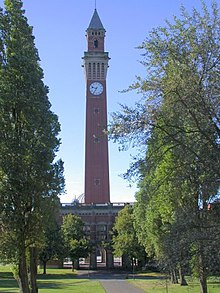Peter Bullock (scientist)
His advocacy of the need to treat soil as a sustainable resource led to his appointment to the Intergovernmental Panel on Climate Change.
Awarded a Fulbright scholarship, he completed his doctorate at Cornell University and worked for the United States Department of Agriculture, before returning England in 1967.
By the 1980s he was head of research, and was instrumental in the survey's transfer to Cranfield Institute of Technology and its continued existence in face of government threats of withdrawal of funding.
[2] Appointed director of the Soil Survey and Land Research Centre, his involvement in national and international scientific and advisory bodies grew: his role as special advisor to the Royal Commission on Environmental Pollution's inquiry into the sustainable use of soil led to an invitation to join the Intergovernmental Panel on Climate Change (IPCC).
[3] He demonstrated the role played by soil in the Earth's ecosystem and the impact of climate change on land degradation.

